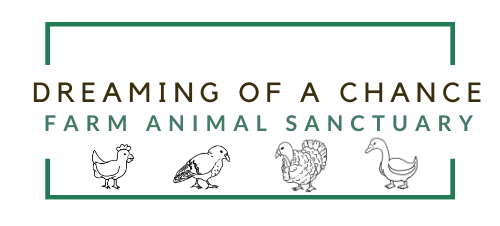Pigeon Racing From The Perspective Of A Lost Racing Pigeon
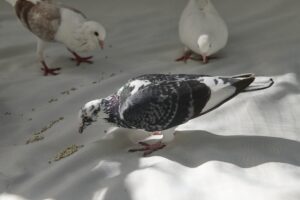
Pigeon Racing: Harley the Racing Pigeon’s Journey
At just a couple of weeks old, Harley found herself severely injured and fighting for her life having been hurt on what was likely her first pigeon race. Harley suffered from 3 deep wounds which in the heat of the summer had become filled with maggots and a subsequent infection. When she was rescue, the poor girl could barely lift her head and had to be syringe fed water as she was too exhausted to drink on her own. She immediately started on antibiotics and had her wounds flushed.
It became apparent that Harley had suffered some nerve damage from one of her puncture wounds (most likely caused by a bird of prey) and was knuckling her foot and couldn’t seem to locate its placement under her body. It took 3 months of physical therapy, multiple wound treatments and wraps, a few weeks of antibiotics, and parasite treatment (heavy loads of parasites as well) but Harley’s nerve damage healed, her strength came back, and her wounds sealed.
The sad thing is Harley is one of the lucky ones. So many of these racing pigeons aren’t found, treated, or sustain injuries so severe that they can’t recover. This is all avoidable.
As a domestic pigeon, these birds should not be free flying. It is comparable to setting your chihuahua in the wild and expecting it to survive all on its own. Very, very rarely could this ever happen.
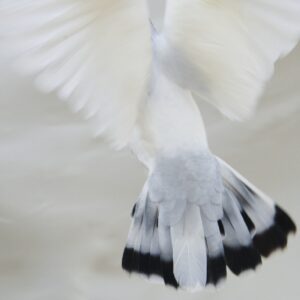
So why do people race pigeons?
Well, let’s take a look at what pigeon racing actually is.
Pigeon racing involves the release of domestic pigeons for a gambling sport. The pigeons have to fly long distances (generally 300-500 miles!) to a certain location deemed home in order to win the race. Pigeons bond for life and oftentimes it is this bond with their mate they motivates them to want to get back home. The long flights often causes extreme exhaustion and high risk of predator attacks. As a domestic bird, they do not know how to obtain food or water on these often several hundred mile races nor how to find proper shelter meaning that most racing pigeons we get in are extremely dehydrated, emaciated, and often have respiratory issues from exposure to the elements.
Impact on Racing Pigeons
According to a study done by Peta, pigeon racing funds 15 million dollars in illegal gambling proceeds each year and it loses an estimated 60% or more pigeons on each race (PETA, 2012) ! That’s insane! And yet, pigeon racing is totally legal in most states and isn’t considered animal abandonment despite thousands of pigeons each year being released into the wild and not making it back.
Oftentimes, individuals who have found lost racing pigeons and contacted us to help have called the racers. Not a single person yet (2022) that we have helped with the found pigeon has had the racer accept the pigeon back.
Isn’t Pigeon Racing Animal Abandonment?
Animal abandonment is literally defined as “leaving behind an animal alone or permitting the animal to be abandoned in circumstances which might cause harm to the animal.” Yet releasing a pigeon into the wild for a race knowing it may not come back and could be injured by predators, flying into foreign objects, susceptible to dehydration, starvation, diseases from wildlife, and more and then refusing it when it is injured, is considered legal.
Pigeons are extremely intelligent and have been taught to help with cancer research, can self- recognize, categorize, and learn the alphabet. They are incredible sentient beings and do not deserve to undergo such torments especially at such a young age. Many pigeons in captivity can live 20+ years. At 6 months old, they are just a youngster still.
Not to mention the implications this has on wildlife. Most racing pigeons we get in have extremely high levels of internal parasites and they are often drug resistant. Additionally, many come with bird lice as well. Pigeons tend to try to self- rescue which is where they try to find a nearby place with people and even the shyest of birds can perch on people or nearby objects in an attempt to be seen. One place they often self rescue at is people’s backyards. If you have a bird feeder, guess who is going to grab a snack and possibly give these parasites to the wild birds or possibly catch diseases the wild birds are carrying.
Many people have a negative connotation towards pigeons that they are dirty, but in reality it is people making them that way. Improper cleaning of enclosures, lack of health checks, and abandoning them into an unknown environment is going to cause these problems. Pigeons when given the opportunity take frequent baths and spend large amounts of time preening themselves to perfection. After all, you got to look good for flirting with the other birds.
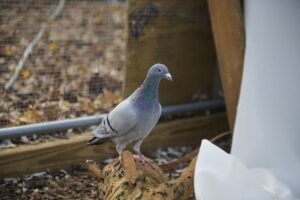
How do I know if I found a racing pigeon?
Racing pigeons will be banded to identify the winners. If found, most racers will not want their pigeons back. Being found means they lost the race and their genetics and vet bills are not favorable to the breeder. If a pigeon has a band, it is domestic. Please try to catch it or call a rescue to catch it. Time is of the essence.
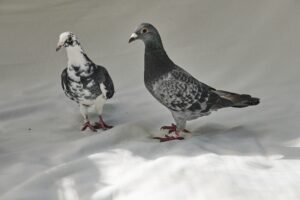
How can I help a racing pigeon?
- If comfortable, try to catch it and bring it into safety
- Do not feed it unless advised by a rescue to.
- If it showing neurologic signs, do not give it a water bowl
- Call a local shelter or sanctuary to help
- You can call us (Dreaming of a Chance) – 845-239-7257 for advice whether local or not.
Note: If an animal has been starved which is the case for many racing pigeons, they must receive specialized food. It takes energy to digest food and oftentimes their last bit of energy is going towards normal organ function. Digesting food, especially rich foods, will shift the remaining energy allocated to the organs to digestion and could cause permanent damage or death of the animal. Do not feed the animal unless you are advised to by a rescue, wildlife rehabber, or avian vet.
Many birds can sustain severe injuries including concussion which can make placing a water bowl in with them dangerous. A concussed bird can easily drown in a water bowl. Again, only place a water bowl in with the bird after consulting with an expert.
Here is a list of rescues in different states that take on pigeons:
Pigeon Rescues:
- Dreaming of a Chance – NY
- Palomacy Pigeon Rescue – CA
- Great Lakes Pigeon Rescue – IL
- Olive’s Place Sanctuary– OK
- Avian Underdogs – CA
Wildlife Rehabbers That Help Pigeons
- Look at your state’s DEC for list (link to NY’s)
- Wild Bird Fund – NY
- Evelyn Alexander Wildlife Center – NY
Article source:
PETA, (2012), Investigation Exposes Pigeon-Racing Cruelty. https://www.peta.org/features/pigeon-racing-investigation/
